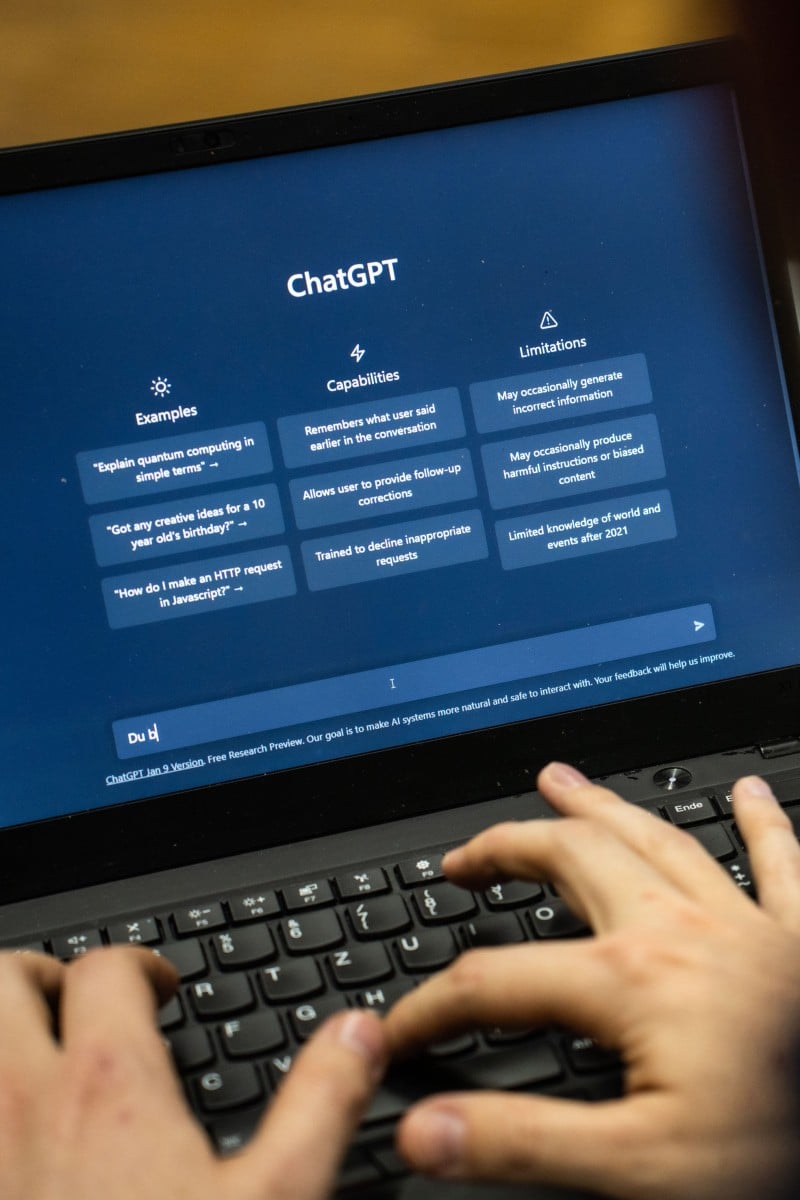
Your Voice: Artificial intelligence leads to discrimination and inequity; how video games benefit kids (long letters)
- ChatGPT is just one example of how AI models perpetuate the biases that already exist in society, writes one student
- Another reader discusses why children should be allowed to play video games for more than just 3 hours a week
 ChatGPT, a chatbot powered by artificial intelligence, has been making waves since it was released last November. Photo: dpa
ChatGPT, a chatbot powered by artificial intelligence, has been making waves since it was released last November. Photo: dpaHave something to say? Send us a letter using this Google form.
The dilemma posed by ChatGPT: will AI be a threat to mankind?
Ernest Hon Lam-sze, Chinese International School
Imagine asking a chatbot to write an 800-word essay about Hong Kong history and receiving it in less than a minute. In the past few months, ChatGPT, an artificial intelligence (AI) model, has broken the internet by doing just that.
Headlines such as “The College Essay is Dead” underscore the chatbot’s ability to draw upon information on the internet to generate text that rivals the writing of most undergraduates. This has big implications for society.
Yet, ChatGPT has also come under fire for potentially advancing discrimination. Though the company behind it has added certain protections to keep the chatbot from giving problematic answers, users have been able to get around this by rephrasing their questions.
Because AI learns from what already exists in the world, it will perpetuate the same discrimination that it “learns” from humans. This could pose a threat to many human rights.
Explainer: What is ChatGPT and why are schools blocking it?
In the 1980s, St George’s Hospital Medical School in London developed an algorithm to select students for admission based on their written applications. However, the data set used in developing the AI included bias against women and those with names that did not sound European. According to the editors of the British Medical Journal, “the program was not introducing new bias but merely reflecting that already in the system”.
This incident is important as it shows how AI that has been trained with faulty data can sustain a vicious cycle and prolong the negative effects of discrimination. If companies’ use of AI exaggerates existing bias, then the system has the potential to reproduce that discrimination. Exaggerating discrimination poses a threat to social stability because it violates the well-being of individuals and groups, and harms their sense of agency.
The rise of AI also poses a threat to economic stability as it has the potential to eliminate many jobs. This will cause greater income inequality, widening the wealth gap.
According to the US National Bureau of Economic Research, automation has caused a decline in blue-collar workers since 1980.
Today, AI is capable of advanced thought through learning and interaction. Many jobs such as driving and customer service are susceptible to automation. Website developers, lawyers and content writers also are at risk of losing their jobs to AI. As we don’t know whether these workers will find other opportunities, this may well cause mass unemployment.
If these work opportunities are replaced, income inequality is further increased. The result could be wide-scale social unrest, such as the boycotting of big tech companies and attacks on their headquarters.
AI is continuing the trends of past technologies, affecting workers and perpetuating discrimination. If we are not careful, this could worsen income inequality, posing a direct threat to society.
Your Voice: ChatGPT can revolutionise everything, even schools
Video games can enhance our abilities
Tiana Lam Cheuk-wing, St Paul’s Secondary School
In this ever-changing era of technology, video games like Genshin Impact and Apex Legends are very popular. Many children cannot control how much they play video games. Game developers are constantly launching new products that steal our precious time.
Recently, I became aware of mainland China’s new policy regarding video game addiction. Children and teenagers are now allowed to play video games for only three hours a week. As a high school student in Hong Kong, I do not think this policy should be implemented here.
Generation Z is the first generation to be “digital natives”. They are known for their ability to adapt to new technology. Their interest in gaming is one of the reasons they are so capable in the digital world.
Some say that children’s addiction to video games is so serious that they cannot think straight. However, I see this the other way around.
If you have ever looked at a player’s interface, you will understand the difficulty of navigating a character in a game. It is not as simple as it appears. Should we also treat this as a talent?
There are always updates to a game – new characters, new functions, new settings – to make it even more complicated. However, children are not bothered. Not only can they adapt to changes quickly, but they can also apply their skills to different situations.
It is quite common to see parents asking their children to help them fix technical problems. Kids may not be familiar with the problem, yet they are able to solve it in the blink of an eye because of their general familiarity with technology and troubleshooting. Isn’t this the best proof of how video games enhance children’s abilities?
Children also relieve their stress by playing video games. I am certain the intention of the rule in China is to strike a balance between gaming and studying. But let’s look at the children’s point of view. After eight hours of school, they are allowed to play video games for less than 30 minutes per day on average. Is this “balance”? This extreme rule is taking away children’s chance to relieve stress. It is keeping them away from happiness, not preventing addiction.
China will limit children to three hours of online gaming per week
When teenagers don’t get to relieve their stress, they may suffer from mental illness. There is no reason to put children’s mental health at risk. Furthermore, applying such extreme rules may lead to more rebellious actions. Educators and parents should bear the responsibility of teaching the youth, not restricting them from their interests. This rule might reduce the time children spend on video games in the short term, but there will be more harm in the long run.
The practicality of the policy should also be taken into account. Nowadays, children do not only play games on their phones. Devices like PlayStation and Nintendo Switch are popular. How can the time spent on them be regulated? This policy may be a waste of time and money.
In a nutshell, video game addiction is serious, but harsh restrictions are not the best way to address the issue. When correctly used, games may have a positive impact on children’s mental health and on their ability to use new technology.
